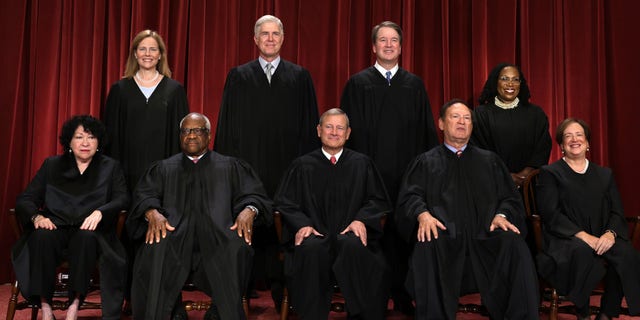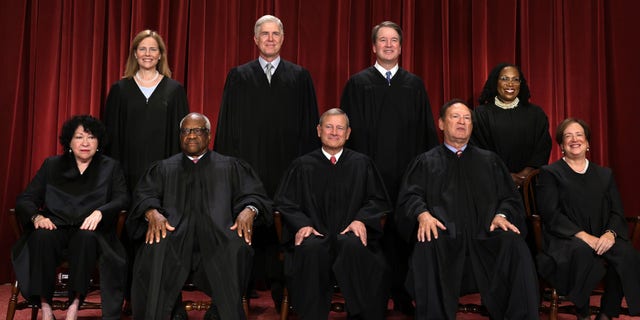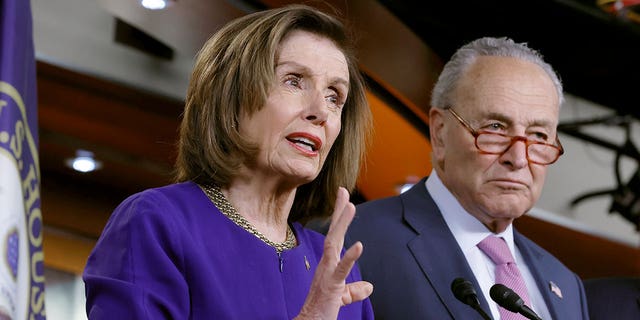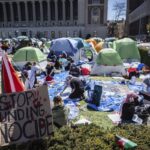
Supreme Court Chief Justice John Roberts cited former House Speaker Nancy Pelosi, D-Calif., in his majority opinion to help explain why President Biden’s student loan handout was unconstitutional.
On Friday, Roberts released the Supreme Court’s opinion blocking Biden’s student loan forgiveness plan, one of the president’s major campaign promises.
In the opinion, Roberts cited then-Speaker Pelosi’s words saying the president did not have the power to cancel federal student loan debt.
WHAT HAPPENS NOW THAT SUPREME COURT STRUCK DOWN BIDEN’S STUDENT LOAN HANDOUT SCHEME

Supreme Court Chief Justice John Roberts cited former House Speaker Nancy Pelosi, D-Calif., in his majority opinion while explaining why President Biden’s student loan handout was unconstitutional. (Alex Wong/Getty Images)
“As then-Speaker of the House Nancy Pelosi explained: ‘People think that the President of the United States has the power for debt forgiveness. He does not,’” Roberts quoted Pelosi’s July 28, 2021, press conference. “‘He can postpone. He can delay. But he does not have that power. That has to be an act of Congress.’”
“Aside from reiterating its interpretation of the statute, the dissent offers little to rebut our conclusion that ‘indicators from our previous major questions cases are present’ here,” Roberts wrote, citing Justice Amy Coney Barrett’s concurring opinion.
Robert’s opinion comes as the Supreme Court hands down several high-profile cases going into the summer months.
Associate Justice Neil Gorsuch issued a harsh rebuke of Associate Justice Sonia Sotomayor’s dissent in the case of a Christian web designer who the court ruled was not obligated to design websites for gay couples.
“It is difficult to read the dissent and conclude we are looking at the same case,” Gorsuch wrote in the 6-3 Supreme Court decision on Friday. That decision said web designer Lorie Smith was not legally required to design websites for gay marriages because doing so would violate her free speech rights and Christian beliefs, despite a Colorado law that bans discrimination based on sexual orientation.
Gorsuch said Sotomayor’s dissent in the case “reimagines the facts” from “top to bottom” and fails to answer the fundamental question: “Can a State force someone who provides her own expressive services to abandon her conscience and speak its preferred message instead?”
“In some places, the dissent gets so turned around about the facts that it opens fire on its own position,” Gorsuch wrote. “For instance: While stressing that a Colorado company cannot refuse ‘the full and equal enjoyment of [its] services’ based on a customer’s protected status . . . the dissent assures us that a company selling creative services ‘to the public’ does have a right ‘to decide what messages to include or not to include . . .’ But if that is true, what are we even debating?”
Gorsuch wrote that rather than address the key aspects of the case, the dissent “spends much of its time adrift on a sea of hypotheticals about photographers, stationers, and others, asking if they too provide expressive services covered by the First Amendment.”

“As then-Speaker of the House Nancy Pelosi explained: ‘People think that the President of the United States has the power for debt forgiveness. He does not,’” Roberts quoted Pelosi’s July 28, 2021, press conference. “‘He can postpone. He can delay. But he does not have that power. ‘That has to be an act of Congress.’” (Chip Somodevilla/Getty Images)
Friday’s decision reversed a lower court ruling that sided against Smith, who said the law infringed on her First Amendment rights by forcing her to promote messages that violate her deeply held faith.
The high court’s majority stated that “under Colorado’s logic, the government may compel anyone who speaks for pay on a given topic to accept all commissions on that same topic — no matter the message — if the topic somehow implicates a customer’s statutorily protected trait.”
CLICK HERE TO GET THE FOX NEWS APP
Sotomayor dissented from the majority, along with Justices Elena Kagan and Ketanji Brown Jackson. They called the ruling “a new license to discriminate” and said the “symbolic effect of the decision is to mark gays and lesbians for second-class status.”
“The unattractive lesson of the majority opinion is this: What’s mine is mine, and what’s yours is yours. The lesson of the history of public accommodations laws is altogether different. It is that in a free and democratic society, there can be no social castes,” Sotomayor said.
The case, 303 Creative LLC v. Elenis, drew national attention as it featured competing interests of the First Amendment right to free speech and non-discrimination against LGBTQ people.
Fox News Digital’s Andrew Mark Miller contributed reporting.








